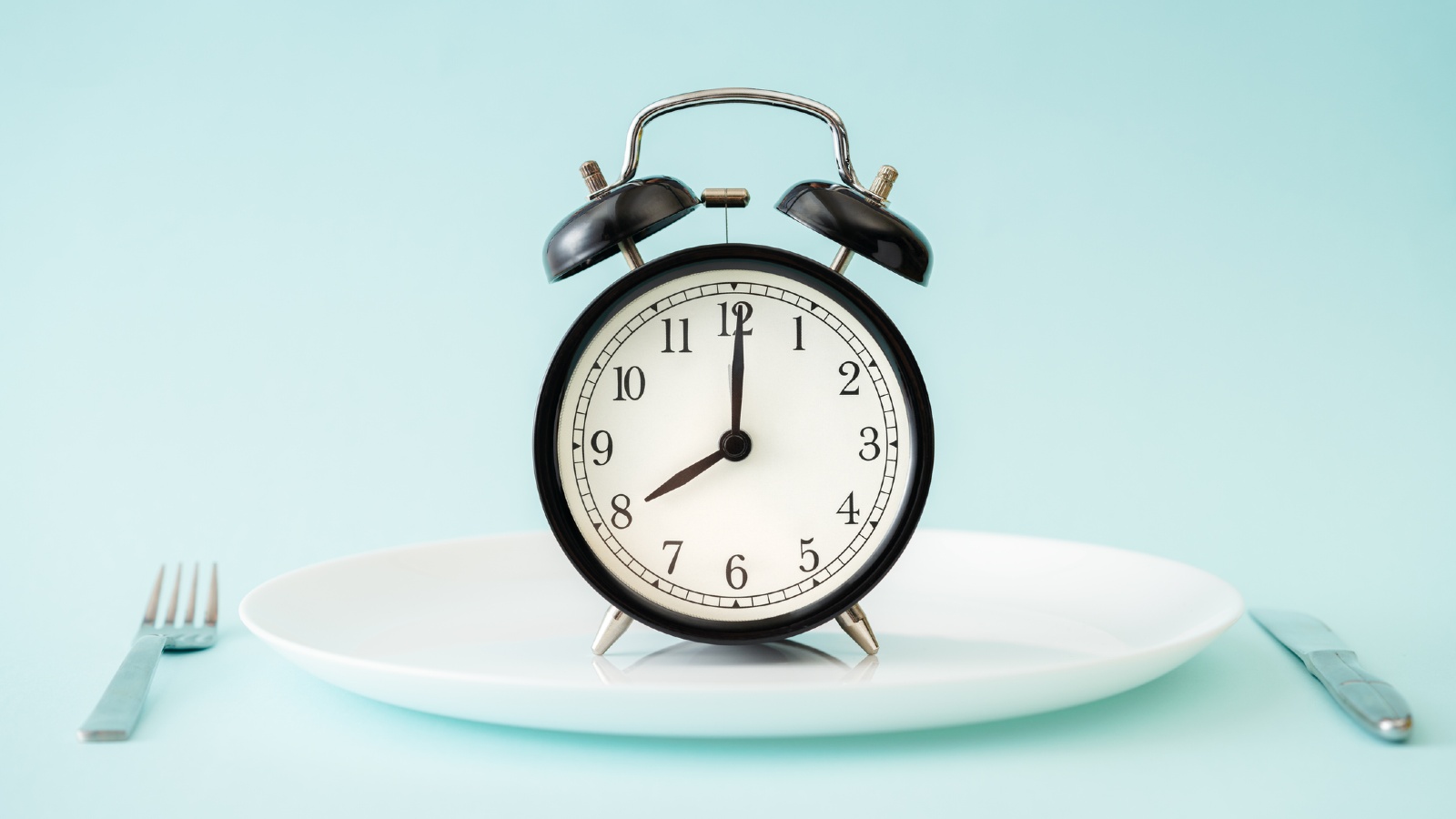Intermittent fasting: What is it and could it be the key to weight loss for the over forties?
Could intermittent fasting be a healthy way for you to lose weight and get in shape - fast?


Want to try intermittent fasting to help you lose pounds? No one embarking on a weight-loss regime wants to start cutting out all their favourite foods. And no one wants to feel hungry 24/7, either. But fasting at key times of the day could help, especially if you are over 40.
In fact, fasting has a long history – ancient hunter-gatherers didn’t always have access to food so we evolved where we could thrive on eating nothing for some extended periods of time.
Here's everything you need to know about intermittent fasting and how to avoid the biggest intermittent fasting mistakes before you give it a try...
What is intermittent fasting?
Intermittent fasting is a method of eating where you cycle between periods of fasting and eating. Studies show that fasting helps you not only lose weight but it also makes you much healthier.
“Intermittent fasting is an eating pattern that cycles between periods of fasting and eating," says dietitian, Dr Carrie Ruxton from The Health & Food Supplements Information Service. "It doesn’t specify which foods you should eat, but rather when you should eat them. In this respect, it is not a diet in the conventional sense but more accurately described as an eating pattern."
“Common intermittent fasting methods involve daily 16-hour fasts (e.g. 16:8 diet) or fasting for 24 hours, twice per week (e.g. 5:2 diet)," says Dr Ruxton. "Fasting has been a practice throughout human evolution. As a result, humans evolved to be able to function without food for extended periods of time.”
How does intermittent fasting work?
“Intermittent fasting works by reducing your calorie intake provided you don’t eat more during the eating period," says Dr Ruxton.
Sign up to our free daily email for the latest royal and entertainment news, interesting opinion, expert advice on styling and beauty trends, and no-nonsense guides to the health and wellness questions you want answered.
And it's not just good for weight loss. "Fasting has other impacts at a cellular and hormonal level," says Dr Ruxton. "Body fat becomes more accessible due to changes in hormone levels during fasting, and cells initiate repair processes during periods without food intake. For example, studies have shown that insulin decreases during fasting which makes body fat more accessible with increased oxidation (burning) of body fat and also improves cell repair."
And that's not all. "Fasting also increases human growth hormone secretion with benefits for body fat reduction and muscle mass," says Dr Ruxton. "Fasting also increases metabolic rate with benefits for weight loss. Overall, intermittent fasting can help you eat less and increase your metabolism. But its main success, like that of any successful weight loss diet, is because you eat fewer calories.”
Intermittent fasting: when do you eat?
There are a few ways to fast. We recommend a variation of what is known as the 16:8 method. This method requires you to fast for 16 hours and eat for eight.
For women however, you could try the 15 hours fasting, nine hours eating approach. This is because eating too little over a long period of time affects women’s hormones and thyroid production.
So for example, you would choose your nine hour eating slot; say 10am to 6pm, and the rest of the day would involve no eating. This can be adapted to suit your lifestyle. Perhaps you eat out a lot in the evening, so might change your nine hours to 1pm to 10pm, or if you love breakfast first thing, adapt it to 7am to 4pm.
What type of foods can you eat?
The good news? You don't have to cut out any foods, but you have to be careful.
“You could eat anything you like although any benefits that might be gained from the diet would not be so great if you choose a high proportion of less healthy foods," says Dr Ruxton. "It’s important to stick to nutritious whole foods during the eating period. Research by HSIS has shown that knowledge of healthy eating is poor with 63% not knowing that fruit and vegetables should constitute a third of a meal plate. This risks poor vitamin and mineral intake particularly on a diet where food is avoided for significant periods of the week. Drink calorie-free beverages like water and unsweetened teas during the fast period to curb appetite and maintain hydration.”
Why intermittent fasting could work for you
“Intermittent fasting is straightforward to follow without complex food and diet instructions," says Dr Ruxton. "However, for some people it can be hard to follow. Many people report feeling hungry and lightheaded on fast days. Yet for others intermittent fasting may seem more achievable that eating less every day.”
Why is intermittent fasting bad?
“Restricting food intake to certain periods of time can cause some people to eat more than usual during eating periods in an attempt to make up for hours spent fasting," says Dr Ruxton. "This may lead to weight gain, digestive problems and the development of unhealthy eating habits. Intermittent fasting may also cause short-term negative side effects at the start such as hunger, weakness and fatigue — though these often subside once a routine is established."
You should also be wary about missing out on essential goodness. “Restricting food intake could also reduce intake of vitamins and minerals," says Dr Ruxton. "In fact, any change of food/diet regime can prejudice vitamin and mineral intake. Take a multi-vitamin and multi-mineral supplement providing recommended amounts of a wide range of micronutrients.”
How to stick to intermittent fasting
Of course, if you’re preparing food for others; kids, family members or a partner, outside of your eating window, you might struggle to avoid food.
You could try brushing your teeth after eating to trick your mind into thinking that meal-time is over. As well as this, be sure to remain hydrated; try enjoying flavoured herbal teas, to keep taste buds happy.
READ MORE:
- Could the Keto Diet Plan work for you?
- All you need to know about the DASH Diet
- Discover the diet that helps cure IBS
How much weight could you lose by intermittent fasting?
“This depends on how much you reduce your calorie intake overall," says Dr Ruxton. "A 2014 review study found that this eating pattern can cause 3–8% weight loss over 3–24 weeks, which would equate to 2-4kg for a person weighing 60kg. According to the same study, people also lost 4–7% of their waist circumference, indicating a significant loss of harmful abdominal fat that builds up around the organs and causes disease. Of note is that research from clinical trials is still at an early stage.”
Is intermittent fasting worth a try if you are over 40?
In a word, yes. As long as you are in good health, then intermittent fasting is definitely worth a try.
“Intermittent fasting can be a safe and easy way to improve your health when managed with a healthy nutritious diet and a healthy lifestyle," says Dr Ruxton. "Though intermittent fasting is generally considered safe for most healthy adults, it’s important to talk to your doctor before giving it a try. This is especially important if you have any underlying health conditions, such as diabetes, low blood pressure, a history of disordered eating or if you take any medication."
However, there are some people who should not try intermittent fasting at all. "Intermittent fasting is also not recommended for women who are trying to conceive or those who are pregnant or breastfeeding,” says Dr Ruxton.
Is intermittent fasting the same as carb cycling?
Alongside intermittent fasting, carb cycling can also aid in weight loss.
"Carb cycling is a dietary approach where you alternate carb intake on a daily basis," says Geeta Sidu-Robb, CEO of Nosh Detox Delivery . "It’s a process frequently used by athletes and bodybuilders and is the rationale behind the 5:2 diet. The rationale is that the body when it gets limited carbs relies on fat as the primary fuel source relapsing ketones. Generally fat intake increases on low carb days."
And it's not just beneficial for weight loss. "There is a large body of research that shows intermittent fasting improves biomarkers of disease, reduces oxidative stress and helps memory function with people losing up to 8% of their body weight in eight weeks," says Geeta.
"In terms of carb cycling, it’s been shown in numerous studies that an overall reduction in calorie intake results in marked health increase and prolongs survival. But carb cycling also gets the body to go to its fat stores to burn stored fat."
Is intermittent fasting expensive?
Intermittent fasting shouldn't cost you anything more than your usual groceries.
“You don’t have to sign up," says Dr Ruxton. "There are plenty of 16:8 plans online. The cost of the diet is your choice as you choose what to put in your shopping basket. You may spend less eating during fewer time periods each week.”
Good luck if you give it a try - we hope it works for you.
Faye M Smith is an award-winning journalist with over 20 years experience in the magazine industry. Her continued work in the area of natural health won her the coveted title of the Health Food Manufacturers’ Association (HFMA) Journalist of the Year Award 2021. Currently Group Health Director across several magazines including woman&home, Woman, and Woman’s Own, Faye specialises in writing about women’s health, especially menopause, relationships and mental health.
